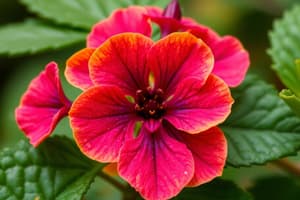Podcast
Questions and Answers
What is the colour of the aglycones of flavonoids?
What is the colour of the aglycones of flavonoids?
- Pale yellow (correct)
- Intense yellow
- Colourless
- Magenta-red
Which flavonoid has been reported to block the 'sorbitol pathway' linked to many problems associated with diabetes?
Which flavonoid has been reported to block the 'sorbitol pathway' linked to many problems associated with diabetes?
- Naringin
- Quercetin (correct)
- Rutin
- Genistein
What is the effect of exposing flavonoids to concentrated HCl or diluted HCl?
What is the effect of exposing flavonoids to concentrated HCl or diluted HCl?
- The yellow colour intensifies
- The colour changes to magenta-red
- The yellow colour disappears (correct)
- The colour remains the same
What is the name of the nucleus common to all flavonoids?
What is the name of the nucleus common to all flavonoids?
Which flavonoids have been reported to reduce the risk of prostate and breast cancers?
Which flavonoids have been reported to reduce the risk of prostate and breast cancers?
What is the colour produced when flavonoids react with conc. HCl and Mg turnings?
What is the colour produced when flavonoids react with conc. HCl and Mg turnings?
What type of flavonoids are found in purple cabbage and grapes and may help protect the lens of the eye from cataracts?
What type of flavonoids are found in purple cabbage and grapes and may help protect the lens of the eye from cataracts?
What is the effect of making flavonoids alkaline?
What is the effect of making flavonoids alkaline?
Study Notes
Types of Flavonoids
- Flavones: apigenin, luteolin, tangeritin
- Flavonols: kaempferol, quercetin, myricetin, rutin
- Flavanones: Hesperitin, naringenin, eriodictyol
- Isoflavones: genistein, daidzein
- Anthocyanidin: Cyanidin, delphinidin, malvidin, pelargonidin, peonidin
- Chalcones: phloridzin, arbutin, phloretin, chalconaringenin
Characteristics of Flavonoids
- Contain the benzopyran nucleus
- Occur either as glycosides or as aglycones
- Aglycones are pale yellow, while glycosides are colourless
- Both forms turn intense yellow when made alkaline, which disappears in the presence of a mild acid
Detection of Flavonoids
- Dissolve extract in ethanol, add conc. HCl and Mg turnings
- Presence of flavonoids is detected with the development of a pink or magenta-red colour
Biological Activities of Flavonoids
- Quercetin blocks the “sorbitol pathway” linked to many problems associated with diabetes
- Rutin and other flavonoids may protect blood vessels
- Soy flavonoids (genistein and daidzein) reduce the risk of prostate and breast cancers
- Anthocyanidins from purple cabbage and grapes may help protect the lens of the eye from cataracts
- Naringin may have anticancer activity
Studying That Suits You
Use AI to generate personalized quizzes and flashcards to suit your learning preferences.
Description
This quiz covers the different types of flavonoids, including flavones, flavonols, flavanones, isoflavones, anthocyanidin, and chalcones, as well as their characteristics, such as containing the benzopyran nucleus and occurring as glycosides or aglycones.




